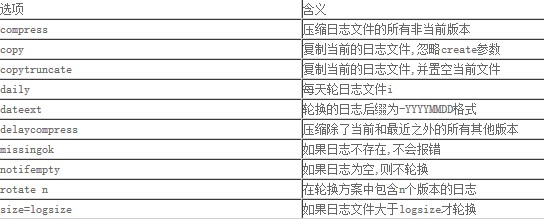日志轮转特别适用于具有固定文件名的日志文件,比如MySQL的出错日志、常规查询日志、慢查询日志等。Linux系统有一个非常好用的根据logratate可以实现自动轮转,本文介绍它的原理和用法。
默认情况下,logrotate部署为每天运行的cron job,你可以在目录/etc/cron.daily里找到名为logrotate的配置文件。那么它是在每天的上面时候运行的呢?打开文件/etc/crontab就知道了,下面是我机器上的情况:
| 1 2 3 4 5 6 7 8 9 10 | SHELL=/bin/bash PATH=/sbin:/bin:/usr/sbin:/usr/bin MAILTO=root HOME=/ # run-parts 01 * * * * root run-parts /etc/cron.hourly 02 4 * * * root run-parts /etc/cron.daily 22 4 * * 0 root run-parts /etc/cron.weekly 42 4 1 * * root run-parts /etc/cron.monthly |
从上面的配置我们可以知道,/etc/cron.daily是在每天凌晨4:02执行。也就是说,每天4:02分/etc/cron.daily/logrotate将会自动执行,下面是它的内容:
| 1 2 3 4 5 6 7 8 | #!/bin/sh /usr/sbin/logrotate /etc/logrotate.conf EXITVALUE=$? if [ $EXITVALUE != 0 ]; then /usr/bin/logger -t logrotate "ALERT exited abnormally with [$EXITVALUE]" fi exit 0 |
从上面我们可以知道,logratate默认的配置文件是/etc/logratate.conf,下面是它的内容:
| 1 2 3 4 5 6 7 8 9 10 11 12 13 14 15 16 17 18 19 20 21 22 23 24 25 26 27 28 29 30 31 32 33 34 35 36 37 | EXITVALUE=$? if [ $EXITVALUE != 0 ]; then /usr/bin/logger -t logrotate "ALERT exited abnormally with [$EXITVALUE]" fi exit 0 [root@lx202 /etc/cron.daily ]# cat /etc/logrotate.conf # see "man logrotate" for details # rotate log files weekly weekly # keep 4 weeks worth of backlogs rotate 4 # create new (empty) log files after rotating old ones create # uncomment this if you want your log files compressed #compress # RPM packages drop log rotation information into this directory include /etc/logrotate.d # no packages own wtmp -- we'll rotate them here /var/log/wtmp { monthly minsize 1M create 0664 root utmp rotate 1 } /var/log/btmp { missingok monthly minsize 1M create 0600 root utmp rotate 1 } |
从上面我们可以知道,这个默认的配置文件将读取目录/etc/logrotate.d,所以我们只要把自己写的配置文件放到该目录下即可。
MySQL本省提供了一个rotate的参考配置文件,在support-files目录下,文件名为mysql-log-rotate,内容如下:
| 1 2 3 4 5 6 7 8 9 10 11 12 13 14 15 16 17 18 19 20 21 22 23 24 25 26 27 28 29 30 31 32 33 34 35 36 | # This logname can be set in /etc/my.cnf # by setting the variable "err-log" # in the [safe_mysqld] section as follows: # # [safe_mysqld] # err-log=/opt/mysql/data/mysqld.log # # If the root user has a password you have to create a # /root/.my.cnf configuration file with the following # content: # # [mysqladmin] # password = <secret> # user= root # # where "<secret>" is the password. # # ATTENTION: This /root/.my.cnf should be readable ONLY # for root ! /opt/mysql/data/mysqld.log { # create 600 mysql mysql notifempty daily rotate 3 missingok compress postrotate # just if mysqld is really running if test -x /opt/mysql/bin/mysqladmin && /opt/mysql/bin/mysqladmin ping &>/dev/null then /opt/mysql/bin/mysqladmin flush-logs fi endscript } |
logrotate常见选项:

我们只要根据自己的需要,修改相应配置即可,下面是一个例子:
1)创建MySQL root密码文件
vi /root/.my.cnf
| 1 2 3 | [mysqladmin] password = *** user= root |
chmod 600 /root/.my.cnf
2)把mysql-log-rotate拷贝至/etc/logrotate.d目录下,修改其内容为:
| 1 2 3 4 5 6 7 8 9 10 11 12 13 14 15 16 17 | /data/mysql/log/slow.log /data/mysql/log/alert.log { create 600 mysql mysql notifempty daily rotate 7 missingok # compress postrotate # just if mysqld is really running if test -x /opt/mysql/bin/mysqladmin && /opt/mysql/bin/mysqladmin ping &>/dev/null then /opt/mysql/bin/mysqladmin flush-logs fi endscript } |
3)执行以下命令测试
/usr/sbin/logrotate -f /etc/logrotate.d/mysql-log-rotate